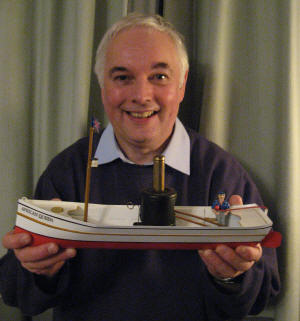A brief history of me and pop pop boats
My only association with engineering was, as a teenager in the late sixties, working for a firm in Southend called Alexander Engineering, or was it Alexandra, I can't remember! The company specialised in the production of glass forming machinery for industry. They joined forces with Bader Machinery of Weybridge and two other companies based at Sittingbourne and Bedford. Together, they played their part in supplying machinery to grace the shopfloors of such UK companies as Thermos, where they turned out the innards for many an engineers flask to carry that precious commodity, tea. Machinery was exported all over the world, much of it related to the manufacture of fluorescent tubes, valves etc. At one stage we won the Queen's award to Industry for our exports to Russia, amongst other places.
 I worked in the buying office, ensuring that everything we bought, from tea-bags to tufnol, coffee to castings and sellotape to stainless steel, had not only arrived, but was allocated to the right job or budget. Many of the technical terms and complex shopfloor procedures are still as much a mystery to me today as they were then.
I worked in the buying office, ensuring that everything we bought, from tea-bags to tufnol, coffee to castings and sellotape to stainless steel, had not only arrived, but was allocated to the right job or budget. Many of the technical terms and complex shopfloor procedures are still as much a mystery to me today as they were then.
So, I guess that's why thirty odd years later, I'm attracted to Lo-technology with a capital "L". Pop pop boats! I first came across these maritime wonders at Barleylands, some years ago but having purchased a couple on the pretext that they were for the children, they were soon forgotten. In the last few years I have suddenly got interested again and have a collection from India, Japan, China, Australia, Phillipines and a super example on loan from Shirley, made in South Africa.
I had the fun of demonstrating my collection at the Museum's "Little Engine Rally" back in July 2000. While the little tin maritime wonders, propelled by the impetus from their primitive "flash boilers" powered by olive oil or small pieces of candle fascinated young and old alike, I had many interesting conversations with people. Comments such as "Oh I've never seen anything like it before" or "I remember those when I were a lad". "Have they ever built a full scale one?" "Would it work?" Another interesting question got me thinking, "Do you have any for sale or where can I buy one?"
At the end of the weekend, I determined to seriously look at obtaining some of these nautical nonentities for selling on behalf of the the Museum. My contacts with a firm in India were not too encouraging as the minimum order was too expensive and purchasing through Hawkin's Bazaar in the UK would not yield enough profit. Then one rainy day, as our family enjoyed the delights of the Weeting Show, I came across a stall selling, amongst other things, some very basic boats. They were made out of recycled tins, the hulls still bearing the proud emblems of Sainsbury's Biscuits and Airfreshener tins. I splashed out and bought 4 different colours. The paint was on the inside of the hull and was very poorly applied. When I got them home, I tried them out. My family call this playing, but it is really very serious maritime experimentation.
They worked really well! In the packet was an e-mail address, which appeared to be in the USA, so I dashed off an e-mail, asking for details of the boats. When I received a reply, I did my sums and decided to purchase an initial quantity of 50 for sale at a "Bit of a Do". The response was amazing and by the end of Saturday I had almost sold out and was wishing I had ordered double. The profit was donated to the Museum.